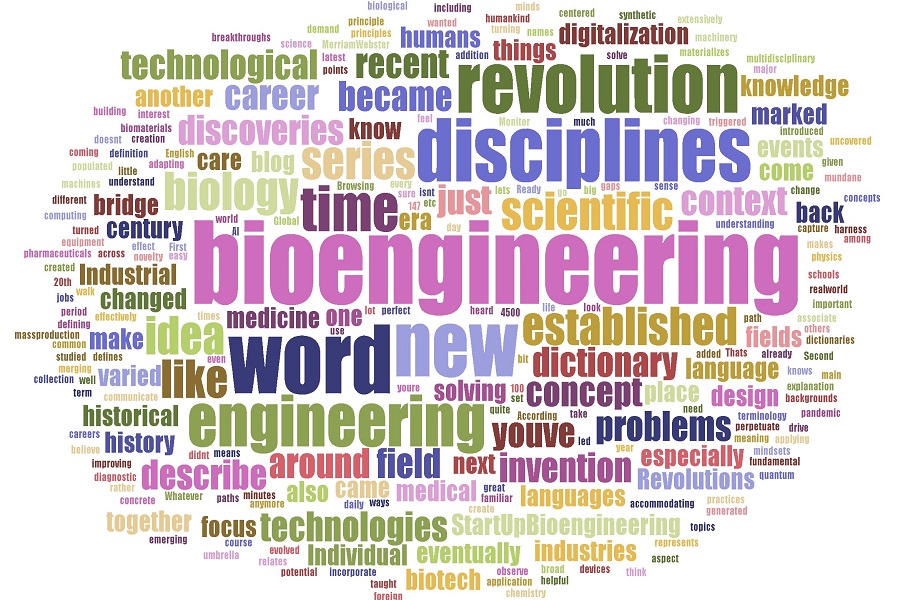What
is
bioengineering?
If you’ve heard this word before but you’re not sure what it means, you’ve come to the perfect place.
This blog is all about understanding what bioengineering is and why we should care about it.
Ready, set, StartUpBioengineering!
Browsing through the dictionary
According to Global Language Monitor, around 4500 new words are added to the English language each year. That would be about 14.7 words a day, or a word around every 100 minutes. That’s quite a lot of novelty to take on, isn’t it?
Languages around the world are adapting to changing times by accommodating new words. But the addition of terminology to languages is just an effect of change. Whatever new concept, idea, or invention materializes, we associate a word to it so we can capture its meaning. We can use this new word to effectively communicate and perpetuate this new concept, idea, or invention.
But what if we came across a new word and didn’t know what triggered its invention? Some words, even if new, can be already familiar or can describe concrete things that are easy to understand and incorporate in daily life. But it could be that some new words need to come with a context or explanation, especially if they describe a broad concept.

Merriam-Webster Dictionary defines “bioengineering” as “the application of engineering principles, practices, and technologies to the fields of medicine and biology especially in solving problems and improving care (as in the design of medical devices and diagnostic equipment or the creation of biomaterials and pharmaceuticals) “. I feel like, as much as this definition makes sense when one knows about this field, it would be helpful to have context when you’ve just been introduced to the idea. So, for that, let’s go back in time for a little bit.
A walk down turning points in history
As humankind evolved, the problems that humans wanted to solve varied from one historical period to another. The interest of humans in science led them to great discoveries which turned the course of history, changed mindsets, as well as established individual scientific disciplines. These disciplines were given new names and populated dictionaries with new words, which eventually became very common: physics, chemistry, biology, and so on. These disciplines became so fundamental over time, that they were also taught in schools, and generated career paths of their own design.
If we look back in time, we can observe how major historical events changed the established ways of things, also in the context of disciplines, jobs, and careers. The First and Second Industrial Revolutions created a demand for machinery, and with that, the word “engineering” came to describe an established career path. But engineering, in principle, represents the idea of applying established scientific disciplines to solving real-world problems.
The most recent technological revolution of the 20th century about “digitalization”, another foreign word that eventually became mundane. Recent events and discoveries, including the pandemic, have been building up to a new technological revolution, which relates to a series of topics, such as AI or quantum computing. But an important aspect of this revolution is centered on bioengineering. This revolution doesn’t focus on big machines and mass-production anymore, but rather on merging disciplines to create new technologies which harness the potential, among others, of biology and medicine.

A new era is emerging
I like to think about “bioengineering” as a defining word for this new revolution, just as “engineering” marked the era of the Industrial Revolutions and “digitalization” marked the latest technological revolution. Bioengineering is the umbrella term for a collection of concepts, such as medical engineering, biological engineering, synthetic biology, etc. In the biotech revolution of this century, the focus is multidisciplinary. Individual scientific disciplines have been extensively studied and main discoveries have been uncovered. But this time, minds from different and varied backgrounds are coming together to bridge gaps of knowledge between disciplines and drive the next breakthroughs. And I would like to believe that the role of the bioengineer is to make that bridge happen.
Are you excited to find out about technologies in the medtech and biotech fields? Are you curious to dig deeper into what Bioengineering is as a degree and a career? Would you like to know what industries bioengineering contributes to and how it creates new industries?
Then stay tuned for the bioengineering-focused series: “StartUpBioengineering”. My name is Antonia Alalitei, I am a recent graduate of Bioengineering from Imperial College London, and I’m bringing this blog series to you, together with StartUpCareer and SSIMA Re:imagine Healthcare, as an initial guide to the field of bioengineering. I envision this series as a blend of my personal experiences, open-source scientific knowledge, and opinions of professionals in the field. I aim to break patterns, inspire the next generation of students, and inform the general public about bioengineering and its place in shaping the future. It is time to make “bioengineering” an “old” word in the dictionary!
Antonia Alalitei

